Iran’s Football Federation has been given serious warnings from the two governing bodies.
The disciplinary committee of the AFC has found FFIRI guilty of serious violations and slapped it with a heavy fine of US$130,000. The breach of the Law which amount to cheating in issuing the Professional License to Iranian clubs despite the fact that those clubs did not meet the standards and the bylaws of professional football clubs as specified by AFC and FIFA.
FFIRI has renewed the licenses of Esteghlal, Persepolis, Shahr Khodro and Sepahan Esfahan to enable them to compete in this season’s AFC Champions League, however, those clubs have not met all the requirements. FFIRI failed to apply the law and issued Professional Licences knowingly that there were many areas of shortfall and violations of the international charter of professional clubs.
The fine is suspended for two years by the AFC, however, a repeat of such breach of the law will mean that FFIRI has to pay the full amount in addition to another punitive measure which normally means expulsion of the club from Asian Competitions.
While AFC has been firm against FFIRI, FIFA was in no mood either with its warning to the Iranians that the bylaws of its football federation are in violation of the international standards set by FIFA and no election will be recognized until an amendment to the laws is incorporated.
In a letter to FFIRI, the International Football Federation, while expressing objections to the FFIRI’s statute, called for the postponement of the election of its President. The election of FFIRI president, vice-Presidents, and executive board members, was supposed to be held on March 5, The International Football Federation, which has long been examining the status of the Iranian Federation, has emphasized in its letter that the Statute of the Iranian Football Federation has not been approved and should be amended. By sending this letter to the Iranian Football Federation, the March 6 election will be canceled and postponed to another time.
Despite the so-called independence of the FFIRI in Iran, the fact remains that the Government through the ministry of Youth and Sports is the de-facto controlling authority of all sports in Iran particularly football. From appointing of Chairmen to CEO’s and selecting the Coaches of Team Melli, The government has ensured a tight and full control of the sports.
Meanwhile, many observers believe that FFIRI election hardly qualifies to be called that as it is all selection and appointment cleverly disguised as free elections.
Mehdi Taj has resigned his post as President of FFIRI due to ill health.






